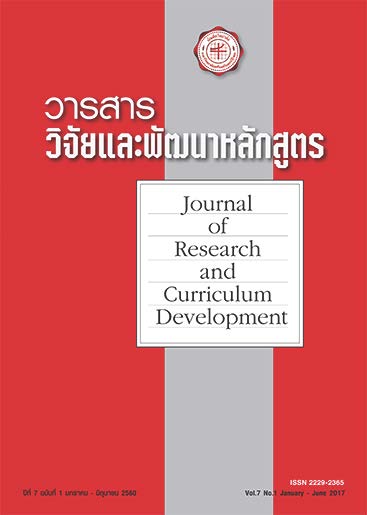การพัฒนารูปแบบการจัดการเรียนรู้ภูมิปัญญาและวัฒนธรรมท้องถึ่นโดยใช้วิธีการทางมนุษยวิทยาสำหรับนักเรียนชั้นมัธยมศึกษา
Keywords:
ครูสังคมศึกษา, รูปแบบการจัดการเรียนรู้, ภูมิปัญญาและวัฒนธรรมท้องถิ่น, วิธีการทางมานุษย์วิทยา, Social Study teachers, local wisdom and local culture instructional model, anthropology strategyAbstract
บทคัดย่อไม่สมบูรณ์
Development of Learning Management Model on Wisdom and Local Culture Based on Anthropological Approach for Secondary School
The main purposes of this research were; 1) to develop the instructional modelof local wisdom and local culture management by using the anthropology techniquefor secondary school students 2) to examine the instructional model with the samplinggroups 3) to evaluate studentsû satisfaction level towards the instructional model and4) to explore the instructional model with secondary school students.Sampling groups for this research consisted of 1) 14 secondary school studentsstudying at Phetchaburi Rajabhat University Demonstration School, 2) 16 secondaryschool students studying at Promanusorn School, and 3) 2 secondary school studentsstudying at Nong Jok Witaya School. All sampling groups were clearly explained by theresearcher and agreed to attend the experiment under their parentsû acceptance.Research tools used in this research contained: 1) structural interview forstudents concerning studentsû interest topic to study, how to study, and their difficultiesin their study; 2) structural interview for teachers concerning situation in local wisdomand local culture management, their difficulties in their instructional management,situation in local wisdom and local culture management; 3) structural interviewfor experts concerning difficulties and ways of instructional management; 4) theAchievement test; 5) The test on anthropology field study skills; 6) the social skillsassessment; 7) the studentsû satisfaction assessment towards the instructional model oflocal wisdom and local culture management by using the anthropology technique forsecondary school students; 8) attitude test towards local wisdom and local culture; 9) questionnaires for studentsû parents; 10) studentsû self- reports; 11) studentsû field tripdiaries; and 12) teachersû field trip diaries.
The research results revealed as followings;
Part 1: The development on the instructional model of local wisdom and localculture management by using the anthropology technique for secondary school studentsrevealed that there were 4 elements; the principle, the objectives, the instructionalmanagement, and the application condition. Stages used in the instructional managementincluded; 1) the anthropology studying, 2) the community visit for studentsû interest,3) studentsû knowledge searching, 4) the community immersion in studentsû field trip;5) knowledge classification; and 6) community knowledge return.
Part 2: The evaluation results revealed that; 1) Studentsû test scores on thecontent of local wisdom and local culture after using the instructional model of localwisdom and local culture management by using the anthropology technique forsecondary school students were higher than before higher than before they studying.2) Studentsû scores after learning by using the anthropology field trip were higher thanbefore they studying. 3) Studentsû performance scores by the anthropology field tripwere at high level and the participation observation was at the highest level. 4) Thesocial skill result was at high level and the group working was at the highest level.5) Studentsû attitude after using the instructional model of local wisdom and localculture management by using the anthropology technique for secondary school studentsindicated the good level.
Part 3: Studentsû satisfaction level towards the instructional model showedthe level of highest. Studentûs satisfaction level towards the community immersionstudentsû field trip showed the level of highest. The reasons are good relationship in thecommunity, the local peopleûs kindness, and learning from real situation and experience.
Part 4: The instructional model exploration with secondary school studentsshowed the following results; the studentsû scores of using local wisdom and localculture were higher than before their studying, studentsû scores for skills in theiranthropology field trip were higher than before their studying, the social skillperformance was at high level and the observation skill was at the highest level, thesocial skill was at the highest level and the civil living skill was at the highest level,the attitude toward local wisdom and local culture was at good level; students agreed to participate in local wisdom and local culture conservation, and studentsû satisfactiontowards the instructional model was at highest level.





